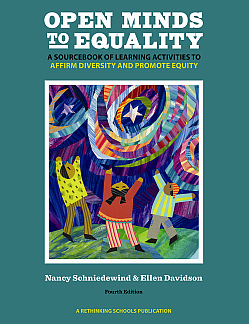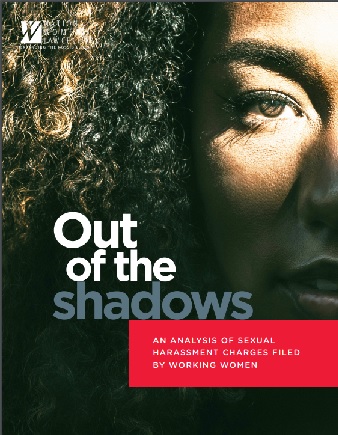Resources Library: Multidisciplinary
Start a Search:
Open Minds to Equality Resource Book

Open Minds to Equality is an educator’s sourcebook of activities to help students understand and change inequalities based on race, gender, class, age, language, sexual orientation, physical/mental ability, and religion. The activities also promote respect for diversity and interpersonal equality among students, fostering a classroom that is participatory, cooperative, and democratic. Learning activities are sequenced to build awareness and understanding. This book is an essential resource for teachers, leaders in professional development, and curriculum specialists.
This fourth edition of Open Minds to Equality contains a wealth of updated information and resources. New lessons address immigration, anti-Muslim discrimination, gender identity, and bullying. The comprehensive, annotated bibliography has been revised and updated.
Out of the Shadows: An Analysis of Sexual Harassment Charges Filed by Working Women

In order to paint a clearer picture of workplace sexual harassment, the National Women’s Law Center analyzed sexual harassment charges filed with the U.S. Equal Employment Opportunity Commission (EEOC) by women in the private sector between 2012 and 2016. Although an estimated 87 to 94 percent of those who experience sexual harassment never file a formal legal complaint, during fiscal year 2016 alone, nearly 7,000 sexual harassment charges were filed with the EEOC, and 82 percent of those sexual harassment charges were filed by women. This report features an intersectional analysis of the charge data by race, additional bases of discrimination alleged, and age; and an analysis of the charge data by industry and size of employer. This analysis establishes a critical baseline for evaluating the impact, if any, of the MeToo movement on filings with the EEOC in future years.
Power and Control Wheel for Lesbian, Gay, Bisexual and Trans Relationships
The Power and Control Wheel for Lesbian, Gay, Bisexual, and Trans Relationships provides definitions and examples of coercive and abusive behaviors that may be present in LGBT relationships. The wheel can be used as a training tool for advocates and service providers, as well as a supportive and enlightening resource for survivors.
Power and Control Wheel: Abuse in Later Life
The Power and Control Wheel is a tool that helps explain the different ways an abusive partner can use power and control to manipulate a relationship. During 2005, NCALL staff asked facilitators of older abused women’s support groups to have participants review the Duluth Domestic Abuse Intervention Project’s Power and Control Wheel. Over 50 survivors from eight states responded. NCALL created this Abuse in Later Life Wheel from their input.
In addition to the tactics on the wheel, many offenders justify or minimize the abuse and deny that they are abusive. Perpetrators of abuse in later life may make comments like “she’s just too difficult to care for” or “he abused me as a child” to blame the victim, or try to minimize the abuse by stating the victim bruises easily or injuries are the incidental result of providing care.
Power and Control Wheel: Immigrant Women
The Power and Control Wheel for Immigrants is a resource prduced by the National Center on Domestic and Sexual Violence (www.ncadv.org) and provides definitions and examples of coercive and abusive behaviors that may be used by perpetrators of violence against immigrants. The wheel can be used as a training tool for advocates and service providers, as well as a supportive and enlightening resource for survivors.

